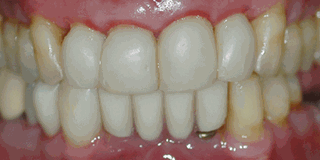Dental clinic :Are you at risk of developing gum disease?

Gingivitis is usually the first stage of gum disease
There are two major forms of gum, or what is known as periodontal disease. They are gingivitis and periodontitis.
Gingivitis is usually the first stage of gum disease, and if it is not properly treated, in some individuals, it will develop into the more advanced and destructive stage called periodontitis. When it develops into this stage, a person will lose the gum and bone around their teeth.
Risk factors
There are several factors that lead to the development of gum disease. Below, we explore some of them and how they can be prevented.
Age
Older people require regular evaluation for diseases and chronic inflammation because as we age, our teeth become vulnerable to several infections and diseases.
Genetics
Although there is no definitive genetic linkage, if a family has a history of periodontal problems and tooth loss, it will be a good basis for the dentist to establish if an individual may be at risk.
Smoking and other diseases
Other risk factors include smoking, diabetes, obesity, poor oral hygiene and having previous history of gum disease.
Gum diseases can be prevented using cheap, cost-effective methods.
Oral hygiene
This can be done through regular brushing, and having your teeth cleaned by the dentist.
Dental care every six months is effective in controlling chronic inflammation, from periodontal diseases. Toothpaste with anti-inflammatory properties can also be prescribed.
Regular dental examination can reveal advanced gum disease or difficulty in eliminating inflammation of the gum.
The body system
There is a connection between gum diseases and increasing risks for other health conditions. For pregnant women, untreated gum disease has the potential to complicate the pregnancy, as germs from the mouth can infect the womb.
Other diseases that can be caused or exacerbated by untreated gum disease are heart disease, stroke, cancer, pulmonary disease and rheumatoid arthritis.
Therefore, it is important to ask about the status of your gum during regular visits to the dentist.
The writer is a dentist
[email protected]




